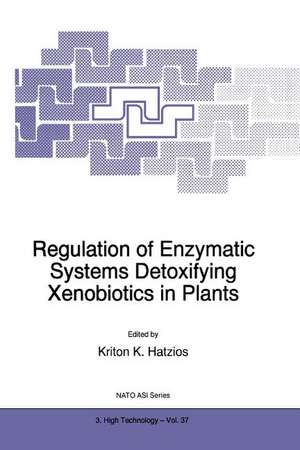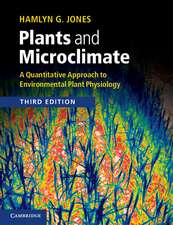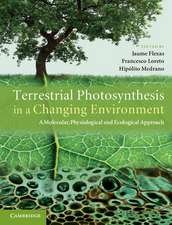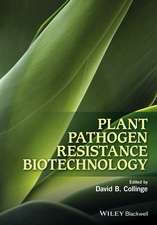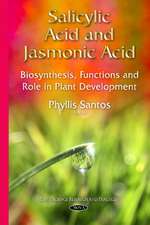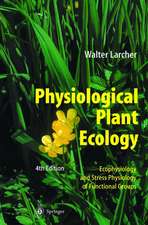Regulation of Enzymatic Systems Detoxifying Xenobiotics in Plants: NATO Science Partnership Subseries: 3, cartea 37
Editat de Kriton K. Hatziosen Limba Engleză Paperback – 9 dec 2010
| Toate formatele și edițiile | Preț | Express |
|---|---|---|
| Paperback (1) | 1221.69 lei 43-57 zile | |
| SPRINGER NETHERLANDS – 9 dec 2010 | 1221.69 lei 43-57 zile | |
| Hardback (1) | 1227.99 lei 43-57 zile | |
| SPRINGER NETHERLANDS – 31 iul 1997 | 1227.99 lei 43-57 zile |
Din seria NATO Science Partnership Subseries: 3
- 24%
 Preț: 1567.22 lei
Preț: 1567.22 lei - 18%
 Preț: 1992.08 lei
Preț: 1992.08 lei -
 Preț: 393.13 lei
Preț: 393.13 lei -
 Preț: 390.63 lei
Preț: 390.63 lei - 18%
 Preț: 1849.41 lei
Preț: 1849.41 lei -
 Preț: 407.19 lei
Preț: 407.19 lei - 18%
 Preț: 1228.96 lei
Preț: 1228.96 lei - 18%
 Preț: 1843.73 lei
Preț: 1843.73 lei - 15%
 Preț: 642.51 lei
Preț: 642.51 lei -
 Preț: 402.76 lei
Preț: 402.76 lei - 18%
 Preț: 1829.86 lei
Preț: 1829.86 lei -
 Preț: 379.48 lei
Preț: 379.48 lei - 18%
 Preț: 1224.54 lei
Preț: 1224.54 lei -
 Preț: 401.42 lei
Preț: 401.42 lei - 18%
 Preț: 1841.68 lei
Preț: 1841.68 lei -
 Preț: 391.99 lei
Preț: 391.99 lei - 18%
 Preț: 1234.46 lei
Preț: 1234.46 lei -
 Preț: 405.28 lei
Preț: 405.28 lei -
 Preț: 396.62 lei
Preț: 396.62 lei - 18%
 Preț: 1226.73 lei
Preț: 1226.73 lei - 18%
 Preț: 1233.52 lei
Preț: 1233.52 lei - 18%
 Preț: 1228.62 lei
Preț: 1228.62 lei - 5%
 Preț: 377.52 lei
Preț: 377.52 lei - 18%
 Preț: 1830.49 lei
Preț: 1830.49 lei - 20%
 Preț: 336.21 lei
Preț: 336.21 lei - 18%
 Preț: 1225.48 lei
Preț: 1225.48 lei -
 Preț: 397.38 lei
Preț: 397.38 lei - 18%
 Preț: 1830.65 lei
Preț: 1830.65 lei - 15%
 Preț: 650.55 lei
Preț: 650.55 lei - 5%
 Preț: 1416.66 lei
Preț: 1416.66 lei
Preț: 1221.69 lei
Preț vechi: 1489.87 lei
-18% Nou
Puncte Express: 1833
Preț estimativ în valută:
233.80€ • 243.19$ • 193.02£
233.80€ • 243.19$ • 193.02£
Carte tipărită la comandă
Livrare economică 14-28 aprilie
Preluare comenzi: 021 569.72.76
Specificații
ISBN-13: 9789048148790
ISBN-10: 9048148790
Pagini: 404
Ilustrații: XIII, 385 p.
Dimensiuni: 155 x 235 x 21 mm
Greutate: 0.56 kg
Ediția:1997
Editura: SPRINGER NETHERLANDS
Colecția Springer
Seria NATO Science Partnership Subseries: 3
Locul publicării:Dordrecht, Netherlands
ISBN-10: 9048148790
Pagini: 404
Ilustrații: XIII, 385 p.
Dimensiuni: 155 x 235 x 21 mm
Greutate: 0.56 kg
Ediția:1997
Editura: SPRINGER NETHERLANDS
Colecția Springer
Seria NATO Science Partnership Subseries: 3
Locul publicării:Dordrecht, Netherlands
Public țintă
ResearchCuprins
Regulation of Enzymatic Systems Detoxifying Xenobiotics in Plants: A Brief Overview and Directions for Future Research.- Endogenous Reactions and Substrate Specificity of Herbicide Metabolizing Enzymes.- Induction of Plant Cytochrome P450.- Role of Cytochrome P450s in Herbicide Metabolism and Selectivity and Multiple Herbicide Metabolizing Cytochrome P450 Activities in Maize.- Inhibition of Plant Oxidative Deactivation: A Mechanism to Enhance Efficacy and Manage Resistance to Thiazopyr Herbicide.- Enzymatic De-Esterification of Xenobiotics in Plants.- The Ascorbate-Glutathione Cycle and Oxidative Stresses in Plants.- Molecular Biology of the Antioxidant Defense Genes Encoding Catalases and Superoxide Dismutases in Maize.- The Biosynthesis of Glutathione Explored in Transformed Plants.- Glutathione, A Regulator of Chloroplast Transcription.- Glutathione Transferases in Crops and Major Weeds.- Characterization and Induction of Maize Glutathione S-Transferases Involved in Herbicide Detoxification.- Role of the Different GST Isozymes of Maize in Herbicide Tolerance: Genetics and Biochemical Analysis.- Activation of Proherbicides by Glutathione S-Transferase.- Flavonoids and Phytohormones, two Toxic Secondary Metabolites, are GST Substrates.- The Role of Glucosyl and Malonyl Conjugation in Herbicide Selectivity.- Fate of Glutathione S-Conjugates in Plants: Degradation of the Glutathione Moiety.- Compartmentation of Detoxified Xenobiotics in Plant Cells.- Defining and Characterizing Synergism and Antagonism for Xenobiotic Mixtures.- Regulation of Xenobiotic Degrading Enzymes with Herbicide Safeners.- Regulation of Xenobiotic Degrading Enzymes with Insecticides and Other Synergists.- Herbicide-Resistant Tobacco and Potato Plants Expressing Mammalian P450 Monooxygenases.- Transgenic Plant Analysis as a Tool for the Study of Maize Glutathione S-Transferases.- Foreign Detoxification Genes Expressed in Plants for Developing Herbicide Tolerant Genotypes: Development of Glufosinate Resistant Vegetables.- Herbicide Tolerance in Transgenic Plants Expressing Bacterial Detoxification Genes. The Case of Bromoxynil.- Cross-Resistance and Herbicide Metabolism in Alopecurus myosuroides Huds..
Recenzii
`It should therefore be recommended to all plant scientists and agronomists ...'
Journal of Plant Physiology, 154 (199)
`...written by plant pysiologists dedicated to this field of research, the book contains a wealth of up-to-date information about the regulation of xenobiotic detoxification. It should therefor be recommended to all plant scientists adn agronomists, should they be interested in plant protection or not.'
Journal of Plant Physiology, 154 (199)
`...written by plant pysiologists dedicated to this field of research, the book contains a wealth of up-to-date information about the regulation of xenobiotic detoxification. It should therefor be recommended to all plant scientists adn agronomists, should they be interested in plant protection or not.'
